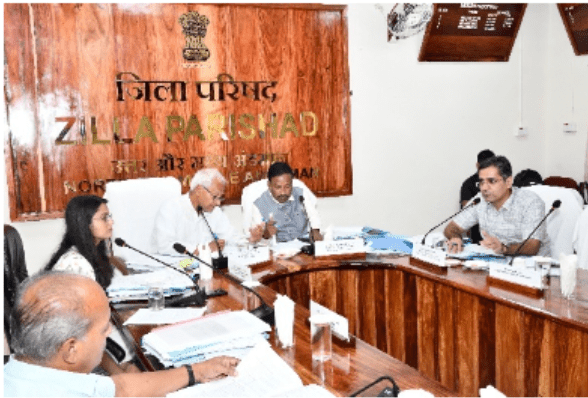Member of Parliament Bishnu Pada Ray has raised strong objections to what he described as administrative negligence in the conduct of District Planning Committee (DPC) meetings across all three districts of the Andaman and Nicobar Islands. Pointing to procedural lapses, he alleged that both rules and timelines laid down for the functioning of the committees have been disregarded, undermining Panchayati Raj Institutions in the Union Territory.
In South Andaman, the DPC meetings scheduled between September 22 and 24 were boycotted by members after Draft Plan Books were supplied only on September 20, a day before the sessions. According to rules, these documents are required to be circulated at least ten days in advance to enable discussion and scrutiny. Members also reported that the Action Taken Report from the previous DPC had not been provided.
Similar complaints have surfaced from North and Middle Andaman, where Draft Plan Books were distributed just a day before the scheduled meetings. In Nicobar, where the DPC is slated for September 29 and 30, neither the Plan Books nor the Action Taken Report has been shared, raising concerns of further disruption.
The MP recalled that the Administration’s notification of September 3, 2002, makes it mandatory for draft plans to be submitted to Zilla Parishads by June each year, followed by timely notice and publication. The finalized DPC plan is then to be submitted to the Lieutenant Governor by October for onward transmission to the Ministry of Home Affairs. He argued that the failure to comply with these requirements has made a mockery of the democratic process and eroded the rights of elected bodies.
Ray also pointed to earlier directions issued by the Chief Secretary in a coordination meeting on August 12, which called for completion of all DPCs before August 31. This directive was supported by planning department circulars issued on July 24 and August 14. Despite this, the committees have not been conducted in accordance with the prescribed timelines. He alleged that no corrective measures were taken by the Lieutenant Governor, indicating what he termed a collapse of supervision at the highest level.
According to Ray, the repeated lapses have left Panchayati Raj representatives with no choice but to boycott meetings. He described this as a consequence of systemic failures, including non-submission of reports and denial of adequate time for deliberations. He expressed concern that such practices erode trust in democratic institutions and damage the credibility of governance in the strategically significant islands.
Calling for immediate intervention, the MP appealed to Prime Minister Narendra Modi and Union Home Minister Amit Shah to enforce strict compliance with rules governing the functioning of DPCs. He sought an extension of the deadline for submission of Revised Estimates for 2025-26 and Budget Estimates for 2026-27, arguing that the delays caused by the administration had left little time for proper planning. He further demanded accountability be fixed on officials responsible for the lapses.
Ray underlined that the islanders, living in isolated districts with limited income-generating opportunities, are heavily dependent on government support and must not be made to suffer due to administrative neglect. With no legislative assembly in place, he stressed that DPCs remain among the few platforms where the people’s representatives can directly influence policy and planning decisions.
He urged that the administration place stronger emphasis on supervision and regular reviews, ensuring that established procedures are not bypassed in the future. He maintained that safeguarding the rights of Panchayati Raj Institutions was essential not only for maintaining democratic norms but also for ensuring that the developmental needs of the islands are addressed effectively.
The criticism comes at a time when DPCs are considered critical for aligning district-level planning with the Union Territory’s overall development goals. The controversy has now placed the spotlight on the functioning of the administration and the need for greater accountability in governance across the islands.







